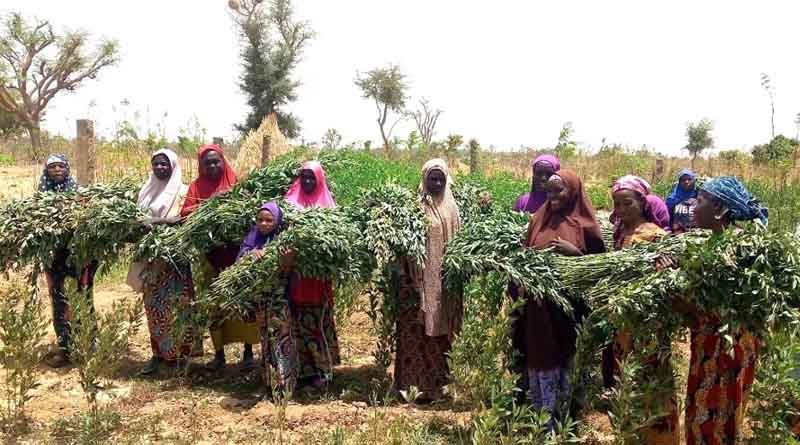Read in
13 December 2024, Niger: In Niger, where erratic rainfall and nutrient-poor soils challenge traditional farming, an innovative solution is transforming agro-pastoral systems.
The scarcity of quality livestock feed, particularly during the dry season—one of the country’s most pressing agricultural challenges—is being tackled by the Enhancing the Productivity and Resilience of Agro-Pastoral Systems project, funded by the Livestock Systems Innovation Lab (LSIL). This initiative has introduced pigeonpea cultivation in the Maradi Region of Niger with promising results.
In 2023, the International Crops Research Institute for the Semi-Arid Tropics (ICRISAT) and its partners piloted improved pigeonpea varieties on demonstration plots managed by agro-pastoral field schools and the results were remarkable.
“In Maradi, pigeonpea thrived in challenging conditions where other crops struggled, showcasing its resilience and its potential to close the critical livestock feed gap,” said Dr ML Jat, Research Program Director for Resilient Farm and Food Systems at ICRISAT.
As part of the project, farmers received training in advanced agronomic practices and were provided with high-quality seeds, enabling them to adopt sustainable farming techniques.
Participatory evaluations revealed a strong preference for integrating pigeonpea with pearl millet, with 94% of farmers endorsing this system for its practicality and benefits.
Inspired by the results of the pilot project, 382 farmers expanded their cropping systems in 2024 to include pigeonpea alongside pearl millet, further solidifying this crop as a key component in building resilient and sustainable agricultural systems in Niger.
Community-Driven Success Stories
The impact of pigeonpea cultivation has gone beyond improved yields—it has inspired innovation within communities. In Maradi, a women’s group took the initiative to cultivate pigeonpea as supplementary fodder for their livestock during the dry season, utilizing small-scale irrigation systems.
Ms Hadiza Abdou, a member of the group, expressed her amazement at their achievement, admitting that she never imagined they could reach such high levels of production. “If we hadn’t tried, we wouldn’t have seen this potential,” Hadiza shared.
This success has become a source of pride and inspiration for the community, showcasing the transformative power of pigeonpea in improving livestock productivity and farm resilience.
“At first, this technology seemed like a dream to us, as we believed pigeonpea was only for lowlands. But now, it’s a reality. The Mil de SIAKA pearl millet variety, too, has been impressive with its dense growth and retained green foliage at maturity—a great benefit for our animals,” said Mr Sayabou Iliya, a participant farmer in the pilot project.
Shifting Perspectives and Expanding Adoption
Before the project, pigeonpea was not cultivated in the area, but by the second year, over 60% of farmers in the project region had adopted the crop, according to Mr Ibrahima Abdoussalam, Scientific Officer at ICRISAT.
Syngenta Gains ISO Approval for New Pesticide Flumetnicam
Please reach out at info@krishakjagat.org, nimishgangrade@krishakjagat.org if you would like to share your company story or advertise in the upcoming issue of Global Agriculture magazine.


